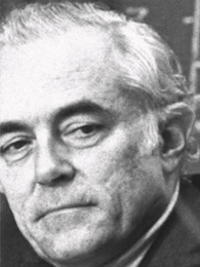John A. Simpson Jr. (1916-2000) was a distinguished American nuclear physicist and astrophysicist.
Simpson was born on November 3, 1916 in Portland, Oregon. He graduated from Reed College, and received his masters and doctoral degrees from New York University. In 1943, Simpson joined the Manhattan Project at the University of Chicago Met Lab and worked as a physicist in the instrumentation division, developing radiation detectors.
Deeply concerned about the dangers of nuclear weapons, Simpson signed the Szilard Petition. He was a co-founder and founding chairman of the Bulletin of the Atomic Scientists. In October 1945, he and Eugene Rabinowitch wrote an influential article for Life magazine declaring that scientists had a moral responsibility to warn against further use of nuclear weapons. Simpson also advised Senator Brien McMahon, chairman of the Joint Committee on Atomic Energy and sponsor of the Atomic Energy Act, which ensured civilian control of nuclear energy.
After the Manhattan Project, Simpson was a longtime professor of physics at the University of Chicago. He made major contributions to astrophysics, including inventing a neutron monitor to detect the intensity of cosmic rays. The equipment he developed was essential to dozens of space missions, including the Pioneer 10 mission to Jupiter, and provided scientists with valuable information about the solar system.
In 2000, Simpson received the William Bowie Medal, the American Geophysical Union’s highest honor. He died in Chicago on August 31, 2000.





